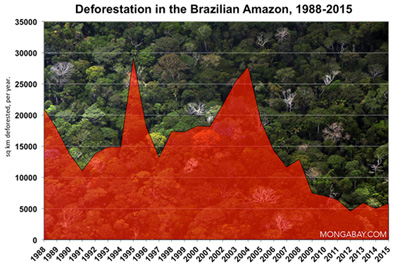Brazil creates 3 Amazon parks
Brazil creates 3 Amazon parks
mongabay.com
June 8, 2008
|
|
In a World Environment Day announcement, Brazilian President Luiz Inacio Lula da Silva unveileved three new protected areas covering 6.4 million acres (2.6 million hectares) of Amazon rainforest but warned foreigners to stay out of environmental affairs in the region, according to the Associated Press (AP) and Reuters.
“The territory is ours, but we want to share with humanity the benefits we are creating through preservation, because we want everybody to breathe the green air created by our forests,” Silva was quoted as saying by the AP.
“It’s not easy to discuss the environment, thinking that the mere creation of a law or a decree will solve the problem. Sometimes a thing that seems so consensual can take two or three years to materialize because we have to respect institutions.”
 Deforestation in the Brazilian Amazon fell by more than 60 percent between 2004 and 2007, but increased in the second half of 2007. Nearly 400,000 square kilometers of forest have been cleared in the past 20 years. |
Silva has faced opposition from Congress on some environmental measures. He has also been at odds with environmentalists including his former environmental minister, Marina Silva, a famed conservationist, who resigned last month after losing a series of battles to protect the Amazon from development.
Still in his speech Silva asserted Brazil’s control over the ecoloically important region and said industrialized nations lack the “moral authority” to lecture the country over how to protect its environment. He noted that developing countries destroyed their forest and polluted on their path towards economic growth.
“We can not permit people to try and write the rules about what we can do in the Amazon,” he said, adding that Brazil is trying to develop the rainforest in an environmentally-responsible way.
Brazil houses more than 60 percent of the Amazon rainforest, the world’s largest tropical forest. Over the past 30 years nearly one-fifth of the forest area have been cleared, largely for agriculture and cattle pasture. Deforestation has slowed since 2004, although it picked up in the second half of 2007 due to surging commodity prices.